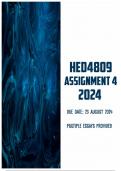, PLEASE USE THIS DOCUMENT AS A GUIDE TO ANSWER YOUR ASSIGNMENT
Please note that the author of this document will not responsibility for any plagiarizing you
commit.
Conflict theorists believe the driving force in complex societies is the unending struggle
between different groups to hold power and status. Discuss this statement by referring to the
school as important instrument in this struggle.
[ESSAY 1]
Conflict theorists, particularly those aligned with Marxist thought, argue that the driving force in
complex societies is the ongoing struggle between different groups vying for power and status. This
perspective emphasizes that societal structures and institutions, including schools, are designed to
maintain and reproduce the dominance of the ruling class. To understand this view, it is essential to
explore the foundational principles of Marxism and how schools function as instruments in
perpetuating power struggles within society.
Karl Marx, the progenitor of Marxism, posited that the primary driver of historical and social
development is the conflict between different classes over control of the means of production. In
capitalist societies, this translates to a struggle between the bourgeoisie (the capitalist class) and the
proletariat (the working class). The bourgeoisie owns the means of production and thus wields
economic power, while the proletariat, who sell their labor, are subjugated and exploited. Marx
argued that this economic base shapes the superstructure of society, which includes its culture,
institutions, and politics.
Marxists extend this analysis to educational institutions, viewing schools as critical components of
the superstructure that serve to maintain and legitimize the existing power relations. Schools are not
neutral entities; rather, they are designed to perpetuate the ideology of the ruling class and ensure the
continuation of their dominance. This is achieved through various mechanisms that shape students'
attitudes, beliefs, and dispositions in ways that align with the interests of the bourgeoisie.
Louis Althusser, a prominent Marxist theorist, elaborated on this concept by introducing the idea of
ideological state apparatuses (ISAs). According to Althusser, ISAs, which include schools, media,
churches, and the family, function to reproduce the ideology of the dominant class and ensure their
hegemony. Unlike repressive state apparatuses (such as the police and military) that maintain control
through coercion, ISAs operate through ideology, subtly instilling values and norms that perpetuate
the status quo. In the context of education, this means that schools teach not only academic content
but also the dominant cultural norms, values, and behaviors that support the capitalist system.
This indoctrination process is often implicit and operates through what is known as the hidden
curriculum. The hidden curriculum refers to the unspoken or implicit values, behaviors, and norms
that are taught in schools. For example, the emphasis on punctuality, obedience, and competition
mirrors the demands of the capitalist workplace, preparing students to fit into their predetermined
roles within the economy. Furthermore, the curriculum often highlights the achievements and
perspectives of the dominant class, marginalizing or omitting the contributions and viewpoints of
subordinate groups.




